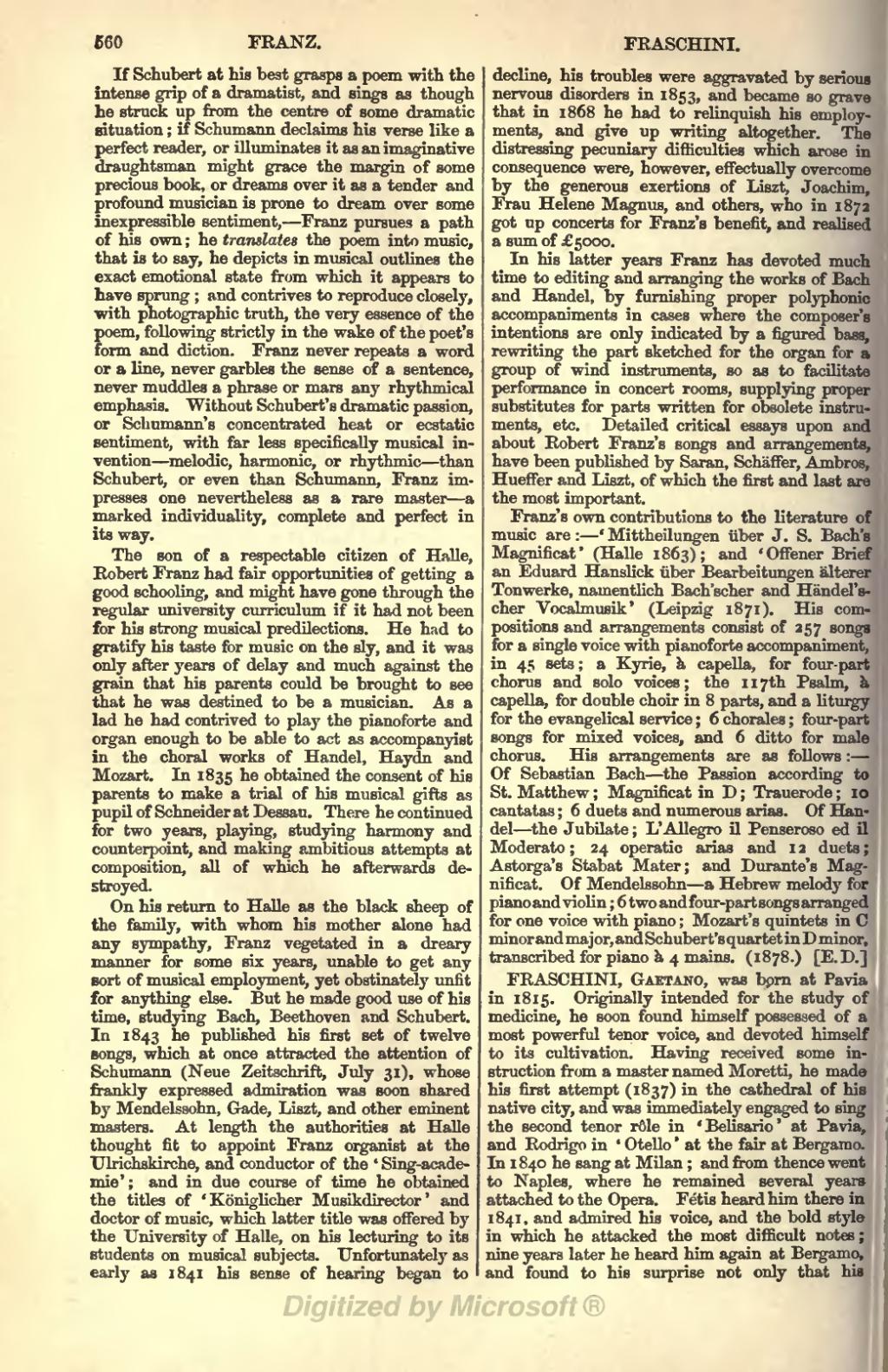If Schubert at his best grasps a poem with the intense grip of a dramatist, and sings as though he struck up from the centre of some dramatic situation; if Schumann declaims his verse like a perfect reader, or illuminates it as an imaginative draughtsman might grace the margin of some precious book, or dreams over it as a tender and profound musician is prone to dream over some inexpressible sentiment,—Franz pursues a path of his own; he translates the poem into music, that is to say, he depicts in musical outlines the exact emotional state from which it appears to have sprung; and contrives to reproduce closely, with photographic truth, the very essence of the poem, following strictly in the wake of the poet's form and diction. Franz never repeats a word or a line, never garbles the sense of a sentence, never muddles a phrase or mars any rhythmical emphasis. Without Schubert's dramatic passion, or Schumann's concentrated heat or ecstatic sentiment, with far less specifically musical invention—melodic, harmonic, or rhythmic—than Schubert, or even than Schumann, Franz impresses one nevertheless as a rare master—a marked individuality, complete and perfect in its way.
The son of a respectable citizen of Halle, Robert Franz had fair opportunities of getting a good schooling, and might have gone through the regular university curriculum if it had not been for his strong musical predilections. He had to gratify his taste for music on the sly, and it was only after years of delay and much against the grain that his parents could be brought to see that he was destined to be a musician. As a lad he had contrived to play the pianoforte and organ enough to be able to act as accompanyist in the choral works of Handel, Haydn and Mozart. In 1835 he obtained the consent of his parents to make a trial of his musical gifts as pupil of Schneider at Dessau. There he continued for two years, playing, studying harmony and counterpoint, and making ambitious attempts at composition, all of which he afterwards destroyed.
On his return to Halle as the black sheep of the family, with whom his mother alone had any sympathy, Franz vegetated in a dreary manner for some six years, unable to get any sort of musical employment, yet obstinately unfit for anything else. But he made good use of his time, studying Bach, Beethoven and Schubert. In 1843 he published his first set of twelve songs, which at once attracted the attention of Schumann (Neue Zeitschrift, July 31), whose frankly expressed admiration was soon shared by Mendelssohn, Gade, Liszt, and other eminent masters. At length the authorities at Halle thought fit to appoint Franz organist at the Ulrichskirche, and conductor of the 'Sing-academie'; and in due course of time he obtained the titles of 'Königlicher Musikdirector' and doctor of music, which latter title was offered by the University of Halle, on his lecturing to its students on musical subjects. Unfortunately as early as 1841 his sense of hearing began to decline, his troubles were aggravated by serious nervous disorders in 1853, and became so grave that in 1868 he had to relinquish his employments, and give up writing altogether. The distressing pecuniary difficulties which arose in consequence were, however, effectually overcome by the generous exertions of Liszt, Joachim, Frau Helene Magnus, and others, who in 1872 got up concerts for Franz's benefit, and realised a sum of £5000.
In his latter years Franz has devoted much time to editing and arranging the works of Bach and Handel, by furnishing proper polyphonic accompaniments in cases where the composer's intentions are only indicated by a figured bass, rewriting the part sketched for the organ for a group of wind instruments, so as to facilitate performance in concert rooms, supplying proper substitutes for parts written for obsolete instruments, etc. Detailed critical essays upon and about Robert Franz's songs and arrangements, have been published by Saran, Schäffer, Ambros, Hueffer and Liszt, of which the first and last are the most important.
Franz's own contributions to the literature of music are:—'Mittheilungen über J. S. Bach's Magnificat' (Halle 1863); and 'Offener Brief an Eduard Hanslick über Bearbeitungen älterer Tonwerke, namentlich Bach'scher and Händel'scher Vocalmusik' (Leipzig 1871). His compositions and arrangements consist of 257 songs for a single voice with pianoforte accompaniment, in 45 sets; a Kyrie, à capella, for four-part chorus and solo voices; the 117th Psalm, à capella, for double choir in 8 parts, and a liturgy for the evangelical service; 6 chorales; four-part songs for mixed voices, and 6 ditto for male chorus. His arrangements are as follows:—Of Sebastian Bach—the Passion according to St. Matthew; Magnificat in D; Trauerode; 10 cantatas; 6 duets and numerous arias. Of Handel—the Jubilate; L'Allegro il Penseroso ed il Moderato; 24 operatic arias and 12 duets; Astorga's Stabat Mater; and Durante's Magnificat. Of Mendelssohn—a Hebrew melody for piano and violin; 6 two and four-part songs arranged for one voice with piano; Mozart's quintets in C minor and major, and Schubert's quartet in D minor, transcribed for piano à 4 mains. (1878.)
FRASCHINI, Gaetano, was born at Pavia in 1815. Originally intended for the study of medicine, he soon found himself possessed of a most powerful tenor voice, and devoted himself to its cultivation. Having received some instruction from a master named Moretti, he made his first attempt (1837) in the cathedral of his native city, and was immediately engaged to sing the second tenor rôle in 'Belisario' at Pavia, and Rodrigo in 'Otello' at the fair at Bergamo. In 1840 he sang at Milan; and from thence went to Naples, where he remained several years attached to the Opera. Fétis heard him there in 1841, and admired his voice, and the bold style in which he attacked the most difficult notes; nine years later he heard him again at Bergamo, and found to his surprise not only that his
